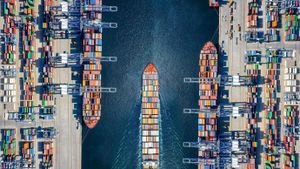UK Prime Minister Keir Starmer is embarking on a diplomatic mission aimed at solidifying Britain's trade ties with the United States following recent alarming statements from President Donald Trump, who has threatened to impose tariffs on goods from Europe. This move has enormous potential ramifications for the UK's trade relations, particularly as the nation continues to find its footing post-Brexit.
During the weekend, Trump hinted at forthcoming tariffs targeting the US's biggest trading partners—Canada, Mexico, and China—with the UK potentially next on the list. "The United States has been ripped off by virtually every country in the world. We have deficits with almost every country – not every country – but almost, and we're going to change it. It's been unfair," Trump told reporters, raising concerns about the economic landscapes of affected countries.
Starmer spoke to reporters on the eve of his meeting with German Chancellor Olaf Scholz at Chequers, the Prime Minister's country residence. He emphasized, "The discussions I’ve had with President Trump centered on the importance of forging strong trading relationships." Despite the tension, Starmer maintained optimism about potential negotiations, insisting, "It is very early days," as he prepares to engage with European leaders to reset the relationship post-Brexit.
The backdrop to Starmer's diplomatic initiative is defined by the reactions of nations affected by Trump's tariff threats. Following the tariff announcements, Canada and Mexico swiftly enacted retaliatory tariffs. Yvette Cooper, the British Home Secretary, cautioned, "Tariff increases really right across the world can have a really damaging impact on global growth and trade, so I don’t think it’s what anybody wants to see." This sentiment resonates broadly within the international community, which fears the looming specter of trade wars.
Starmer's planned European engagement is multifaceted, focused not just on trade but also on defense and security collaboration. His meeting with Scholz will discuss shared concerns, particularly surrounding Russia's aggression, with both leaders aiming to bolster security as they navigate the shifting political and economic landscapes influenced by the US administration.
Critically, there’s recognition among UK leaders, such as Minister Catherine McKinnell, of the importance of maintaining positive relations with the US. "I think we have every reason to look forward to a positive future with the United States and trade," McKinnell stated, reflecting hopes for a collaborative approach as the pressure from tariffs mounts.
Yet, the overarching uncertainty persists. Trump has yet to specify the potential for imposing tariffs on the UK, creating an unsettled atmosphere. EU countries, dealing with their own tariff complications, may view the UK’s post-Brexit status with skepticism. Their disarray could either provide the UK room to negotiate or hinder Starmer's efforts to renegotiate relations.
The UK's precarious position implicates it not only with the US but also within EU relations. Starmer's diplomatic trek stands to gain significant insight, as he aims to reset the tone of UK-EU interactions concerning trade and defense, emphasizing cooperation rather than division. Nevertheless, balancing the interests of both sides will be challenging. Moving too close to the EU may provoke ire from the American administration, which has shown volatility over similar negotiations.
Starmer seems fully aware of the potential pitfalls. He faces criticism for lacking decisiveness, which could hinder his effectiveness on such high-stakes diplomatic missions. Navigational opportunities may arise if Starmer and his team can effectively communicate the UK's unique position as friendly allies aimed collaboratively at tackling shared challenges, particularly defense issues related to Russia.
With Trump's administration clearly focused on national interests and boasting no disdain for leveraging trade talks, Starmer must tread carefully. His navigation through the tensions between these two elephants—Trump's America and Europe's needs—is as delicate as it is necessary. The stakes are high, and the ramifications of his strategy will shape the future of UK trade.



